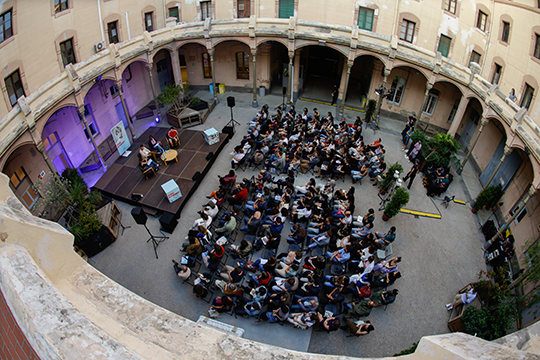The Legacy of Utopian Practices - Chronicle of Sunday 16 October
And all those people? You can't imagine it when a few minutes earlier you come across a group of peripatetics in the Plaça del Diamant, but Virreina is already full. Have all these people come attracted by the emerging voices of Layla Martínez and Eudald Espluga, or because they feel that the finiteness of the world is piercing their daily experience?
Two manifestos, in the form of a prologue, inaugurate the event Utopia and Dystopia. The first, by writer and environmental activist George Monbiot, aims to encourage. Judging by the applause received, the objective seems to have been achieved. Be brave, says Monbiot, find your courage: history shows that demands that lower ambition to make them feasible go nowhere: "The lower the demand, the lower the commitment".
Philosopher Corine Pelluchon also tries to instil hope in the audience. "Fear, hopelessness and eco-anxiety," says Pelluchon, "can be overcome if we share the starting point, which is love for the world. The need to break the blockade in the face of the announcement of the end of the world due to environmental collapse has been one of the most repeated ideas during the dialogue that has subsequently been established. Layla Martínez admitted that dystopian visions of the future (hegemonic even among social movements) are paralysing and can be used to justify the shortcomings of the present. "What we lack is a horizon of change", said the author of Utopia is not an island: we need to devise measures that can be implemented now, but which at the same time point to this horizon. For example: the reduction of working hours. "We are not satisfied with half-hearted measures", she said.
Like Martínez, Eudald Espluga warned of the danger of taking refuge in nostalgia with reactionary overtones. For the young philosopher, "we must change the static idea of utopia for that of utopian practices" which, in a continuous and imperfect exercise, and from the place of imagination, generate the conditions to prepare the future from the present.
Espluga mentions the myth of Oedipus. The chronicler does not remember the reason for this, but is grateful for it, thinking of the afternoon session. At 5 p.m., in the Plaça de les Dones del 36, writers Pedro Olalla and Arnau Pons discuss the legacies of Athens and Jerusalem. "Apart from the cultural heritage, the Greek legacy", says Olalla, "is also an attitude, and that is what gives it dynamism". Then comes the infinite inventory: sedentary life in the cities, the spread of agriculture, astronomy, language, geometry, myths, philosophy, literary genres, history (a way of approaching reality), medicine, music... If he had to highlight two, Olalla would highlight the "logos", a concept that weaves thought, word and reason as the principle of creation of the world; and the humanist tradition, that is, the "confidence in human beings and the combative attitude to defend their dignity".
At his side, while a crowd of children make noise on the slide in the square, Arnau Pons regrets that the Jewish gaze has ended up assuming the cliché that assigns revelation to Jerusalem and reason to Athens. "The Hebrew legacy is the great unknown because it lags behind the Judeo-Christian one, due to the hegemony of Greek and Roman", he adds. He goes on to analyse with erudition the dialectical side of the Talmud and the contribution of the Hebrew legacy in terms of human rights: the abolition of slavery and the refuge cities where people who had committed involuntary murder were sheltered.
The conversation then turns to religion and democracy. Democracy, Olalla notes, "was born as an ethical and revolutionary project that tried to bring the rulers and the ruled closer together, redefining the common interest. What we have now are covert oligarchies that obey the mandate of money, the opposite of what existed then". Both traditions, concludes the essayist, "pointed to very high ideals that are still valid and have been reduced to vague forms, distorting their meaning".
I think about all this as I make my way to the metro: confidence in the human being and the combative attitude, Monbiot's courage, the legacies that have summoned us to listen to a talk about legacies, the children in the square, the collapse, fear, hope, utopian practices...
On arriving at the CCCB's Pati de les Dones, everything dissolves in the intense cocktail of music, poetry and performance led by poets Anne Waldman and Eduard Escofet.
A legend, a punch, a party?
Avant-garde and activist, close collaborator of the most important artists of the second half of the 20th century, winner of the American Book Award, founder of the Jack Kerouac School together with the beatniks Allen Ginsberg and Diana Di Prima... Waldman is a myth of American poetry.
His poetry is body sees rhythm, commitment...
An uncontrollable force...
says Eduard Escofet in his introduction. The drums beat ancient drums.
You have to let your mind flow...
The violin tiptoes up a spiral staircase.
She invokes her masters...
The legacy.
All of it is a celebration...
The trumpet ascends to the sky.
The guitar takes a stony path.
A celebration of the word that takes to the streets and squares...
"We come out of our little theatres of hope and fear", repeats the sibyl Waldman on stage. I look around me. The square is again full to overflowing. Enveloped in the nest of acoustics, all the ideas look like dominoes about to start a new game of thought.
The seagulls join the heart, and everything seems to have a strange coherence that you wouldn't know how to describe, now that the Biennial is coming to an end.
Jorge de Miguel
